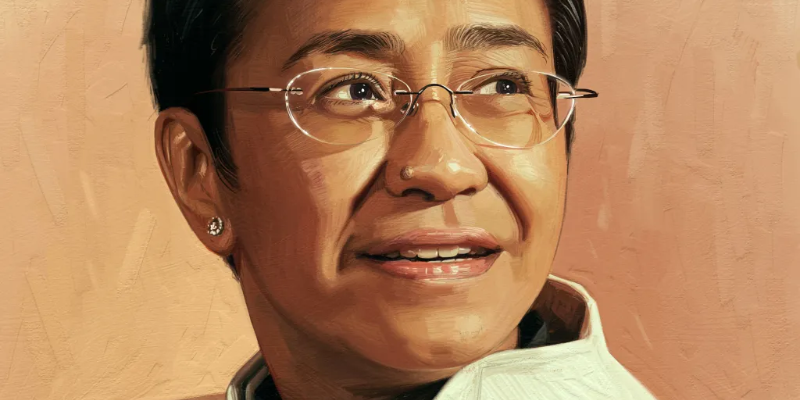Maria Ressa on Fighting for the Safety of Journalists
This Week on the Talk Easy Podcast with Sam Fragoso
Illustration by Krishna Bala Shenoi.
Talk Easy with Sam Fragoso is a weekly series of intimate conversations with artists, authors, and politicians. It’s a podcast where people sound like people. New episodes air every Sunday, distributed by Pushkin Industries.
*
Nobel Peace Prize-winner Maria Ressa has spent the past decade advocating for the protection of journalists. In light of the paperback release of How to Stand Up to a Dictator, we return to our urgent conversation with the trailblazing author and activist.
We begin by unpacking the fragmenting effects of social media, how the internet gave power to authoritarian regimes around the globe, and Ressa’s five years uncovering those operations. Then, we walk through her early years: moving from the Philippines to suburban New Jersey at age ten, three lessons from childhood, and her discoveries at Princeton.
On the back-half, we discuss Ressa’s serendipitous entry to the newsroom, why she founded Rappler in 2012, and her critical reportage on President Rodrigo Duterte’s drug war, which led to her arrest by the Filipino government in 2019. Now, she’s charted this fight in her book, How to Stand Up to a Dictator. To close, we unpack her continuous pursuit of the truth, her recognition as a 2021 Nobel Laureate, and an ode to a lifelong friend.
Subscribe and download the episode, wherever you get your podcasts!
From the episode:
Sam Fragoso: The result of your reportage was constant online harassment. The people sending these messages were emboldened by President Duterte’s contempt for the press. All of this brings us to what happens on February 13th, 2019. You’re arrested for the first time and brought to NBI headquarters. NBI is essentially the FBI in the Philippines, and they strategically planned to arrest you, so they could hold you overnight. I want to read from your book, How to Stand Up to a Dictator, which describes what happened that next day as you made bail and began to talk to the press.
Maria Ressa: Oh, yeah. The next day I was supposed to post bail, and I stewed all night thinking, “Oh my god! It’s not as if there wasn’t a spotlight on me. I was one of the most prominent journalists— I headed a news organization. Imagine what they would do to somebody who was a young kid in a dark alley.”
That night, when my government took away my freedom, they drew the line of repression directly to me. It was the moment when my rights were violated, when I went from being a journalist to being a citizen. If they could do this to journalists with some power, in the glare of the spotlight, what would they do to vulnerable citizens literally left in the dark? What recourse did a poor person have in a dark alley?
“For me, it’s about two things: abuse of power and the weaponization of the law,” I told the assembled reporters. It was the first time I had spoken so harshly in public; every time the government did something draconian, it radicalized me. “This isn’t just about me, and it’s not just about Rappler. The message that the government is sending is very clear, and someone actually told our reporter this last night: ‘Be silent, or you’re next.’ So I’m appealing to you not to be silent, even if—and especially if—you’re next!”
Press freedom is not just about journalists; it is not just about Rappler; it is not just about me. Press freedom is the foundation of the right of every Filipino to have access to the truth. Silence is complicity because silence is consent.
“What we’re seeing is death by a thousand cuts of our democracy,” I continued. “And I appeal to you to join me… I’ve always said that when I look back a decade from now, I want to make sure—”
Article continues after advertisementMy voice broke then, so I repeated the sentence. “I want to make sure that I have done all I can. We will not duck. We will not hide. We will hold the line.”
SF: I was listening to you read that passage, being moved once again and inspired by your passion and commitment to this work, to this calling. But I don’t think we can talk about the work you do without talking about the very real human consequences of what you do. To do that, I want to go to June of 2020, where the family of Daphne Galizia, who was killed for her reportage, issued this statement:
Over the years, we watched the former Prime Minister of Malta Joseph Muscat and his cronies pursue increasingly deranged attacks on Daphne. These included online abuse and harassment campaigns, vexatious tax investigations, false criminal charges that were thrown out of court, and civil and criminal libel suits.
Daphne died with five criminal libel charges and 43 civil libel suits pending against her.
This targeted harassment, chillingly similar to that perpetrated against Maria Ressa, created the conditions for Daphne’s murder.
Article continues after advertisementThe government of the Philippines is creating the possibility of a violent attack against Maria and other journalists.
So, I must ask, as you return back home in the coming months— how do you process that specter? The worst-case scenario in which your life is profoundly at risk?
MR: I embrace my fear. The goal of all of this is to make us stop doing our jobs because we’re afraid. So, for me in my head, it was really simple. I tried to just imagine what the worst case scenario would be—and I start with that in the prologue—I imagine that, and then I figure out what I would do in each one, embrace it, and defang it. And then I keep going.
Because I think that in situations like this where the government attacks journalists, the goal is that you self-censor. That you mute your journalism, or that you stop doing journalism. Our goal is not to stop, not to change, to keep doing excellent journalism, to build our communities, and to hold our government to account. I think about it like how we live with pollution— it’s part of the air you breathe, but you don’t let it stop you from walking or running. You just keep going.
SF: Maria, I asked a question about you, and of course you ended up talking about everyone else. But what about your heart?
MR: It’s like planning coverage in a war zone. You know there are dangers, but if you plan well, you plan your way in, and you plan your way out. The difference here is we’re not walking into a conflict area— we’re living it. I suppose that I live life as a breaking news reporter. I’m ok living with the uncertainty of it. The things I can control, I can control. The things I can’t, I let go of. Half the problem of dealing with fear is your own mind. The other part is that I know, whether I go to jail or the worst-case scenarios happen, it depends on how I react now. What I do today. And I claim that.
__________________
Maria Ressa is the co-recipient of the 2021 Nobel Peace Prize for her work defending freedom of expression and democracy. She is CEO, cofounder, and president of Rappler, the Philippines’ top digital news site, and has been a journalist in Asia for over thirty-six years. She was TIME Magazine’s Person of the Year in 2018 and won the UNESCO World Press Freedom Prize in 2021. Among the many other awards she has received are the prestigious Golden Pen of Freedom Award from the World Association of Newspapers and News Publishers, the Knight International Journalism Award from the International Center for Journalists, the Shorenstein Journalism Award from Stanford University, and the Sergei Magnitsky Award for Investigative Journalism. She grew up in the Philippines and the United States and currently lives in Manila.
Sam Fragoso is the host of Talk Easy with Sam Fragoso, a weekly series of conversations with artists, activists, and politicians. His writing has appeared in The Atlantic, Vanity Fair, and NPR. After conducting seminal interviews with icons like Spike Lee, Werner Herzog, and Noam Chomsky, he independently founded Talk Easy in 2016.




















